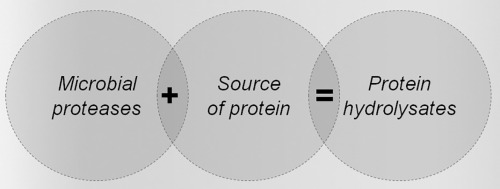Microbial proteases are enzymes produced by microorganisms like bacteria, fungi, and yeast. These powerful enzymes break down proteins into smaller peptides and amino acids, playing crucial roles in many industrial processes. They are nature’s tiny scissors, meticulously cutting protein molecules into useful pieces.
Table of Contents

Why Use Microbial Proteases?
Efficiency and Specificity: Microbial proteases offer a cost-effective and environmentally friendly alternative to traditional chemical methods. They work at specific pH and temperature ranges, making them highly controllable.
Vast Diversity: The microbial world boasts a remarkable diversity of proteases with unique properties. This allows us to select enzymes tailored for specific applications.
Scalability: Microorganisms can be easily cultured in large-scale bioreactors, providing a sustainable and scalable source of these powerful enzymes.
Where Do Microbial Proteases Shine?
Microbial proteases have found their way into a wide range of industries, contributing to everything from food and laundry to medicine and leather processing:
Food Industry
Meat Tenderization: Proteases break down tough muscle fibers, making meat more tender and flavorful.
Cheese Production: They help in curdling milk, transforming it into cheese.
Baking: They enhance dough’s extensibility, producing softer and airier bread.
Brewing: Proteases improve the extraction of proteins from malt, contributing to beer flavor and clarity.
Detergent Industry
Stain Removal: Proteases effectively remove protein-based stains like blood and grass, making detergents more powerful.
Fabric Softening: They break down protein-based fibers in fabric, making clothes softer and more comfortable.
Leather Industry
Leather Processing: Proteases remove hair and loosen collagen fibers, making leather softer and more pliable.
Dehairing: They efficiently remove hair from animal hides, reducing the need for harsh chemicals.
Pharmaceutical Industry
Drug Production: Proteases are used to synthesize peptides and hormones, crucial for various medications.
Therapeutic Applications: They are being explored for treating conditions like cancer and inflammation.
Other Industries
Bioremediation: Proteases help break down pollutants like wastewater and agricultural waste.
Biofuel Production: They assist in converting biomass into biofuel.
How are Microbial Proteases Made?
The production of microbial proteases involves a multi-step process:
Strain Selection: Selecting the right microorganism is crucial. Different microbes produce different types of proteases with unique properties.
Cultivation: The chosen microorganism is grown in large-scale bioreactors under controlled conditions, ensuring optimal growth and enzyme production.
Extraction: After growth, the enzyme is extracted from the microbial cells using various techniques like filtration or precipitation.
Purification: Further purification steps are carried out to remove impurities and isolate the desired protease.
Formulation: The purified enzyme is formulated into a usable product, often in a liquid or powder form.
Looking Ahead
The research and development of microbial proteases continue to advance, exploring new applications and improving existing ones. Genetically modified microorganisms offer the potential for even greater efficiency and specificity. As we continue to unravel the secrets of these tiny enzymes, their impact on our world will only grow.
Microbial proteases are versatile and powerful enzymes with a vast impact on various aspects of our lives. From food processing and laundry detergents to disease development and environmental cleanup, these tiny catalysts play crucial roles in many industries and biological processes. Understanding their properties and harnessing their potential opens exciting possibilities for addressing diverse challenges and improving our world.
Frequently Asked Questions(FAQ)
Define Microbial Proteases?
It is enzymes produced by microorganisms like bacteria, fungi, and yeast. These powerful enzymes break down proteins into smaller peptides and amino acids, playing crucial roles in many industrial processes. They are nature’s tiny scissors, meticulously cutting protein molecules into useful pieces.
Why we use Microbial proteases ?
We use it for,
Efficiency and Specificity: Microbial proteases offer a cost-effective and environmentally friendly alternative to traditional chemical methods. They work at specific pH and temperature ranges, making them highly controllable.
Vast Diversity: The microbial world boasts a remarkable diversity of proteases with unique properties. This allows us to select enzymes tailored for specific applications.
Scalability: Microorganisms can be easily cultured in large-scale bioreactors, providing a sustainable and scalable source of these powerful enzymes.
Related Articles

